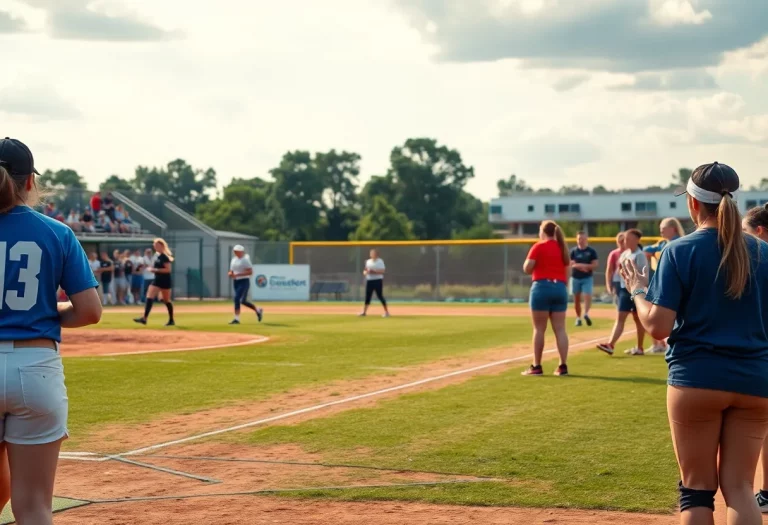News Summary
Minneapolis is facing heated discussions as Marissa Rothenberger, a transgender athlete, competes in the Minnesota State High School softball tournament. With the school ranked No. 2, this situation raises questions about fairness in sports, legal gender changes, and inclusivity. Amidst growing debates, legal actions are being taken against policies that allow transgender athletes to compete in female categories. This controversy mirrors national discussions as similar cases emerge, emphasizing the challenges in balancing equality and competitive integrity within sports.
Minneapolis in the Spotlight: A Heated Debate Over Transgender Athlete Participation
Minneapolis is buzzing with excitement and controversy as Marissa Rothenberger, a trans-identifying male pitcher for Champlin Park High School, gears up to compete in the Minnesota State High School League (MSHSL) girls’ softball tournament.
Champlin Park High School, known for its competitive athletic teams, is currently the No. 2 seed in the Class AAAA bracket and will face off against Eagan in the quarterfinals this Tuesday. If all goes well for Rothenberger and the team, they could find themselves playing in the semifinals on Wednesday and potentially the championship game on Friday. The stakes are high for everyone involved!
A Journey Unfolds
Rothenberger was born male as “Charlie Dean” but began identifying as female and has been competing on girls’ softball teams in Minnesota for several years. Shortly after his ninth birthday, Rothenberger’s mother sought to change his legal sex marker on his birth certificate, a request that was granted. This change has allowed Rothenberger to participate in the girls’ category of the tournament, despite ongoing debates regarding the fairness of such policies.
As the spotlight shines on Rothenberger, discussions surrounding transgender athlete eligibility have intensified. In light of policies that aim to address these situations, the NCAA has implemented rules requiring female-only participation in women’s sports. This move came after an executive order from the previous administration. Additionally, organizations like USA Softball have followed suit with similar guidelines.
The Minnesota Context
In Minnesota, navigating the waters of gender identity and athletic eligibility becomes tricky, particularly when legal gender changes occur on identity documents. The MSHSL has determined the eligibility requirements for transgender athletes based on the Minnesota Human Rights Act and the state constitution. Essentially, this means that male athletes who identify as female may compete against girls in sports.
Governor Tim Walz, a vocal supporter of the trans activist movement, has publicly criticized party members who are hesitant about these policies. Meanwhile, a group called Female Athletes United has filed a lawsuit against the state and several school districts, particularly targeting Rothenberger’s situation. This legal challenge is part of a growing wave that has sparked debates across the nation.
Wider National Implications
The controversy doesn’t stop in Minnesota. Similar cases have surfaced nationally, such as trans-identifying male AB Hernandez, who won state titles in California, and Verónica Garcia, who clinched a girls’ state championship in Washington. These instances have only intensified the dialogue regarding the fairness of allowing transgender athletes to compete.
Moreover, a Texas-based nonprofit has taken the issue to federal court, arguing that Minnesota’s policies infringe upon Title IX protections and undermine the rights of female athletes. Plaintiffs in this case include three female high school students advocating for a change that would exclude transgender athletes from competing in female sports.
The Response from Legal Authorities
Officials, including Attorney General Keith Ellison, have expressed that excluding transgender students from participation is a form of discrimination, particularly against those who already face bullying and harassment. On the flip side, Female Athletes United contends that allowing transgender athletes creates an uneven playing field, claiming they have lost competitive opportunities due to this policy.
As of now, the MSHSL has found itself under investigation by federal authorities due to the previous administration’s executive order concerning transgender athletes. It’s worth noting that in 2015, the MSHSL initially voted to allow transgender student-athletes in girls’ sports, becoming the 33rd state to implement such policies.
A Challenging Debate Ahead
The competition is fierce on the field, but off the field, the debate is proving just as energetic. With Rothenberger’s participation stirring both support and outrage, Minneapolis is at the center of an important conversation about athlete eligibility, fairness, and inclusivity.
As we look ahead, keep an eye on Champlin Park’s progress in the tournament and stay tuned for updates on this evolving story. Whether you’re a fan of the game, an advocate for equality, or simply curious, it’s clear that this topic is not going away anytime soon! The future of sports could well depend on how we address these intricate issues.
Deeper Dive: News & Info About This Topic
LIVE BALL Resources
Minneapolis Softball Star Marissa Rothenberger Shines on the Field
Cheyenne’s High School Softball Season Hits Week 7
NCAA’s Controversial Policy on Women’s Sports Sparks Outcry Among Trans Athletes and Advocates at Tufts University
NCAA Implements Restrictive Policy on Women’s Sports Participation Amid New Executive Order
NCAA Imposes New Policy Restricting Women’s Sports Participation to Assigned Female Athletes
NCAA Updates Participation Policy for Transgender Athletes Amid Controversial Executive Order
Trump Signs Executive Order Banning Transgender Athletes from Women’s Sports, Sparking Controversy and Potential Legal Action
Additional Resources
- Star Tribune
- Wikipedia: Transgender athlete controversy
- Outkick
- Google Search: Transgender athletes Minnesota
- CBS News Minnesota
- Google Scholar: Transgender athlete lawsuits
- KSTP News
- Encyclopedia Britannica: Transgender athletes
- Fox 9
- Google News: Transgender athlete Minnesota news


